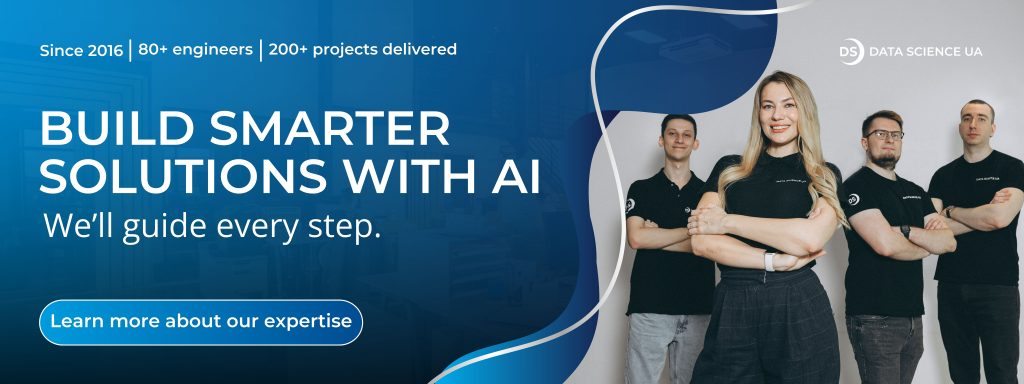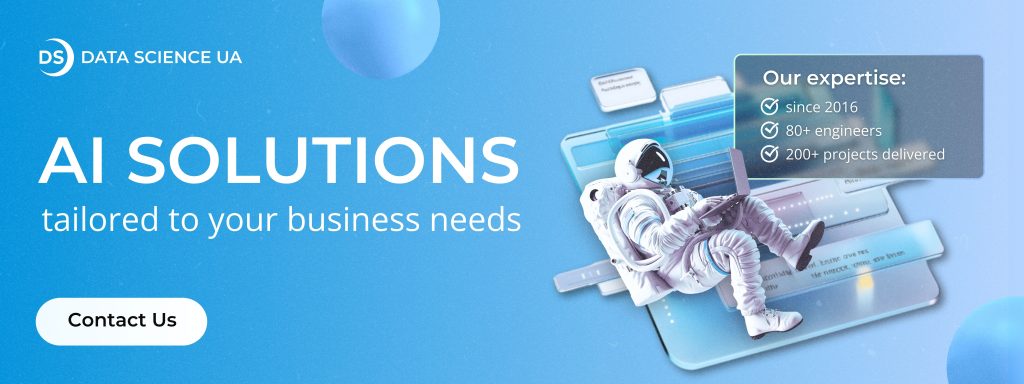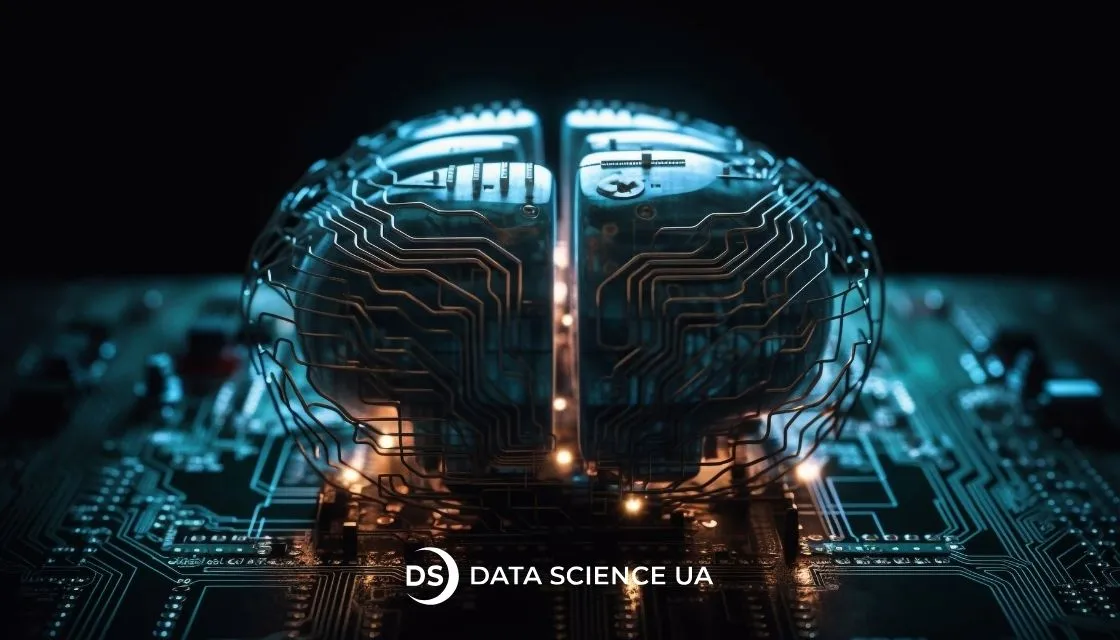AI agents: Business impact examples
Understanding AI agents and their value
AI systems have long gone beyond scientific publications. But the last few years have brought a new wave of practical interest in so-called AI agents – solutions that can independently coordinate tasks, make decisions, and even become an integral part of a human expert team’s workflow.
This is what Ukrainian companies and large corporations in the US and Europe are already implementing today. These are the projects we implement at Data Science UA, helping our clients automate routine communication, speed up data processing, and significantly reduce the workload of managers and support. Learn more about AI agent development services on our website.
What are AI agents?
AI agents are autonomous digital assistants that can perform complex sequences of tasks without constant human intervention. Simply put, these are systems that have a goal, plan the path to achieve it, collect the necessary information, make decisions, and adapt along the way.
The use of such agents is not limited to support or chats. They are being implemented in logistics, financial risk analysis, legal document review, technical documentation, feedback processing, and even product description generation.
From a technical point of view, an AI agent is a set of modules that include:
- Natural Language Processing,
- decision-making tools,
- integration with databases or external APIs,
- The ability to remember the previous context.
Want to know more about our expertise – reach out to us here!
Key features driving business impact
When we started working with agent-based systems, clients often asked: ‘What are the specific businesses benefit?’. Today, we have a clear answer. The main features that make a difference are:
Automation of routine processes
Instead of employees manually responding to typical requests, an AI agent does it for you. For example, in support, this means a 40-60% reduction in the workload of the team.
Response speed
The system works without pauses and days off. It analyses the text of the query, searches for the answer in the internal database, and provides it in less than a second.
Adaptation to changes
If the company’s policy changes or a new product appears, there is no need to retrain 50 employees. It is enough to update the knowledge base for the agent.
Scalability
AI agents are easily scalable – one agent can handle thousands of requests simultaneously without the need to hire new people.
Secure work with sensitive data
Many of our clients choose AI development services that allow them to deploy such systems locally, without transferring data to the cloud or third-party services.
For whom is this relevant now?
- Businesses that have a large volume of documents and internal communication.
- Companies working with customer support;
- B2B services that need to train new employees quickly;
- E-commerce, where an agent can guide a customer through the funnel, from product to payment.
- HR departments that want to automate answers to frequently asked questions.
Collection of practical AI agent case studies
Most often, trust in AI starts with case studies. How exactly did the agent help improve customer support? What has changed in the business after logistics automation? How much time did the HR department save after implementing an agent for internal queries?
We have compiled a selection of practical AI agents use cases in business, ranging from e-commerce to the pharmaceutical sector. These are stories of how businesses can change without undergoing large-scale restructuring, often starting with just one process. Here you can find everything you wanted to know about AI agents.
Industry-specific AI agent examples
Customer service automation
AI agents business impact is especially evident in customer support. Whether operating in e-commerce, mobile delivery, banking, or insurance, companies across Europe and the US are making AI agents a new staple for quality services.
Are there any real benefits of this trend from a business standpoint? Let’s look at the simple AI agents examples to find out: most customer requests are quite repetitive. People often ask about order status, refund terms, or technical issues. A human operator takes time to find the answer every time. An agent responds immediately. How so? It is integrated with the company’s CRM, knowledge bases, policies, and contracts, with necessary data flowing right where it’s needed.
Benefits:
- 50-70% reduction in the workload of operators
- quick answers without waiting
- unified response logic for all users
- scalability without hiring new people
Financial services and fraud detection
Financial companies have been working with fraud detection systems for years. But now, AI agents in finance can act not only as a filter but also as an active analyst: analyze transactions in real time, assess risks, and interact with users in case of suspicious actions.
For example, if a user logs in from a new country and immediately makes a transfer, the agent automatically initiates a clarifying message while simultaneously checking the transaction for dozens of parameters: IP geography, payment frequency, and interaction history. If a risk is detected, the transaction is declined, with a comprehensive explanation of prerequisites for such a decision displayed to the user. Such systems are already in operation in British neo-banks and US fintech companies. We implemented similar modules for Ukrainian clients, adapting them to local conditions and regulatory restrictions.
Contact us to learn more about AI!
Healthcare diagnostics and research
AI agents in healthcare no longer just read data – they participate in workflows: from processing patient requests to helping doctors make a preliminary diagnosis.
How it works: a doctor enters data or a scan of an image. The agent compares it with the existing cases in the database, analyses the symptoms, and provides 2-3 hypotheses with an explanation. It is not a replacement for a doctor, but an assistant that works with thousands of cases simultaneously.
Research institutions utilize agents to categorize clinical records, search for relevant publications, and automatically extract information from PDFs and X-rays.
What it gives:
- Faster preparation of diagnostic reports
- Minimisation of human error
- Reduced time spent on data entry and search
- Support in routine research
Supply chain and inventory optimization
In logistics, even 5% of errors or delays can cost millions. That’s why the AI agents business impact is valued so highly – these systems help track cargo, predict inventory, and effectively respond to delays and interruptions in supply.
For example, if a shipment is delayed, the agent not only records the status update but also assesses the impact of the delay on stocks, predicts the arrival time, predicts the arrival time, alerts the responsible manager, and offers options for action: changing the warehouse, redirecting, and notifying customers.
Another use case is automatic inventory: the system analyses stocks, demand, seasonality, and generates procurement recommendations daily. See AI in logistics & supply chain.
Result:
- minimisation of dead stock
- reduction of shortages
- better logistics planning
- faster response to force majeure
Manufacturing process efficiency
In manufacturing, agents are used to detect deviations in real time. For example, if one of the lines starts to run slower or exceeds the waste rate, the agent can detect the problem before it leads to losses.
They are also used for technical monitoring: if a part starts to fail, the system ‘notices’ it and sends a signal to the technical service. This is called predictive maintenance. And for those who want to know more, welcome to manufacturing analytics solutions.
Results that customers get:
- less downtime
- better quality control
- savings on repairs and logistics
- Reduced staff costs
Cross-industry applications
AI agents facilitate improved performance not only in industry-specific tasks. They are of great use in universal processes, like data protection, HR management, and marketing. Below are a few AI agents business impact examples across industries.
Cybersecurity and threat management
Cyberattacks are becoming more precise and widespread. Not only are large banks in the crosshairs, but also logistics, e-commerce, SaaS companies, and even medical systems. Humans do not have time to process thousands of risk signals per day. AI agents do.
Today, the agent does not just search for vulnerabilities but works with internal logs, user behavioural patterns, and server request logic. It automatically detects anomalies: for example, suspicious activity after business hours, unusual API calls, and logins from new geolocations.
Benefits:
- Instant threat detection
- Blocking access without human intervention
- Reduced workload for cyber teams
- Detailed logs for investigations
HR and talent management
In large companies, most HR queries are routine. ‘Where can I find the sick leave policy?’, ‘How do I apply for a holiday?’, ‘When will I get my next paycheck?’. Even more frequent are document searches, onboarding, contact updates, and meeting organisation. This is where an AI agent takes over 70-80% of communication.
For example, a new employee receives basic information in the messenger: what to read, where to find instructions, and whom to contact. If a question arises, the agent pulls up the answer from the knowledge base or creates a ticket in the system.
Among other AI agents business impact examples for HR – more precise talent analytics. Nowadays, AI agents are used to predict the risks of dismissal, analyze employees’ productivity, and look for overlaps in career paths.
Measurable ROI from AI agents
Cost reduction and efficiency gains
AI agents can reduce costs by automating common processes. For example, instead of employees manually responding to queries or checking information, the system does it for them, faster and without errors. This is especially noticeable in customer support, finance, or internal IT procedures. Another advantage is that such automation systems do not require staff to be retrained if policies change or a new product is launched. It is enough to update the data for the agent.
Revenue growth through personalization
Unlike generative AI, AI agents also help businesses grow through personalisation. They analyse customer actions – what they viewed, bought, and how they behave in the app or on the website. Based on this, an individual offer is generated that is much more precisely tailored to the customer’s needs. In the retail, service, or education sectors, this allows for better customer retention and stimulation of subsequent purchases.
Emerging trends in AI agent adoption
Ethical AI and governance
The topic of ethics in artificial intelligence implementation has already become an integral part of any integration project. Businesses are increasingly concerned about their systems making biased decisions, irresponsible data processing, and violating internal or legal rules. To mitigate these concerns, separate policies are created: from the principles of data collection to checking the logic of agents’ work.
Hybrid AI-human workflows
Most companies are not on a mission to replace their people with AI. Instead, they strive to reduce the workload and save costs, with AI agents taking over the technical routine, and employees focusing on key strategic and creative tasks. This applies to customer support, document processing, and technical validation.
Sustainability through AI optimization
AI agents are being used as a tool not only to save money but also to manage resources responsibly. For example, in logistics, they plan routes with minimal use of transport. In manufacturing, they help avoid downtime or excessive energy consumption. This is important both in terms of cost and long-term environmental goals.
Choosing the right AI agent solution
Before launching any AI project, it is necessary to understand the needs of the business: what exactly the system should do, what processes should be automated, and who will interact with the agent – employees or customers. At this stage, a key question often arises: whether to choose a ready-made solution or create a custom one.
Universal systems may be suitable for simple tasks, but as soon as nuances appear, we are talking about custom development. If a company has several internal databases, specific terminology, or high security requirements, the best choice is an agent created for the client’s infrastructure.
Steps for seamless integration
The integration of an AI agent does not start with code, but with analysis. The team first identifies the entry points: which requests, in which channels, from which users. Then, they build scenarios: how the agent should respond, where to send requests, and when to connect a human. This helps to avoid situations when the system gets ‘lost’ in the process.
The next stages are testing, launching, and then training the system on real data. That is why we recommend implementing the agent in stages, with a clear goal at each step. Read more about technical integration on Machine Learning Services.
Partner with us and don’t let your competitors get ahead of you!
Scaling AI agents for small businesses
Today, there are opportunities to scale solutions for small and medium-sized businesses without incurring high costs. For example, a small company can integrate an agent to support orders, process mail, or perform basic HR tasks.
The important thing is that these systems do not require a separate IT team – often, one manager and a competent integrator are enough. Some of the AI agents business impact examples prove that even companies with a team of up to 10 people can benefit from them in the first month of operation.
The future of AI agents: What’s ahead?
AI agents are already moving towards greater autonomy. Today, they are determining the best approach to a task; tomorrow, they’ll be able to build complex workflows without human intervention. In the coming years, the demand for agents that can manage full-fledged processes, such as launching an advertising campaign or managing a project team, is expected to grow.
Another trend is the combination with voice interfaces. It will allow you to interact with an agent not only via chat but also by voice-in apps, call centres, and smart devices.
Final thoughts
AI agents are a tool that is already changing the way we work with data, customer support, sales, and management. They can be scaled, adapted to specific tasks, and implemented in stages. Businesses get results quickly, without high costs and technical barriers.
If you are thinking about process automation, you should start small. And if you don’t know where to start, our team is ready to help you assess your tasks and find a solution.
FAQ
What purposes do AI agents serve?
AI agents perform specific tasks instead of humans: they automate responses to queries, process documents, coordinate the work of teams, and search for information in internal databases or systems. They are used in customer support, HR, logistics, analytics, sales, and many other areas.
How do AI agents enhance business productivity?
They reduce the workload of teams, speed up the processing of common requests, and reduce the amount of manual work. AI agents impact allows employees to focus on more complex tasks and make decisions faster, thanks to access to up-to-date information without waiting or asking questions.
Are AI agents different from chatbots?
Yes. A chatbot is responsible for basic, scripted dialogue. An AI agent is a more complex system that can interact with CRM, APIs, documents, knowledge bases, and even make independent decisions within a task. Read more on our Chatbot Development Services.
Can small businesses leverage agentic AI agents?
Yes, and it’s already happening. Small businesses can use agents to automate support, handle queries, work with prices, orders, or internal communication. It’s affordable without big budgets, and it has a quick impact.








